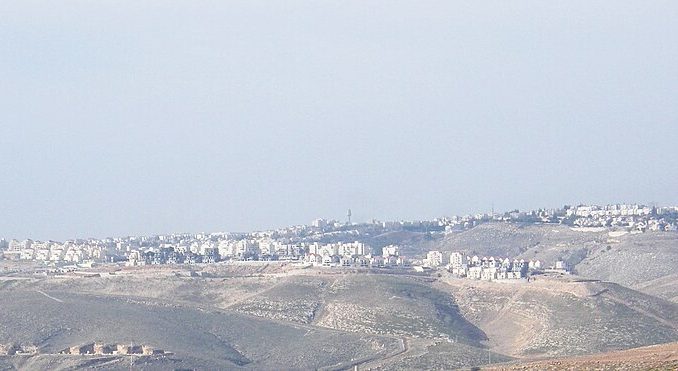Peloni: These proposals/projects represent very important changes, with significant implications for a post-Oslo future.
The two-state paradigm, once widely endorsed, is increasingly viewed as untenable given the persistent threats and failures of past negotiations.
Avi Abelow | May 15, 2025
 Israel, Ma’ale Adumim, view from Kfar Adumim (Photo by Yiftachsam – Own work, Public Domain)
Israel, Ma’ale Adumim, view from Kfar Adumim (Photo by Yiftachsam – Own work, Public Domain)
For decades, Israel has navigated the tension between the aspiration to restore full sovereignty for Jews in their ancestral homeland and the persistent international pressure to partition the land to carve out yet another failed terror state. Recent developments suggest a decisive shift in this dynamic.
Israeli Finance Minister Bezalel Smotrich’s remarks at the Makor Rishon Settlement Conference signal a pivotal moment. He announced that the government’s intention to advance development in the long-stalled E1 corridor, a move that has faced international opposition since the Rabin era.
The E1 project is not merely a zoning issue; it is a strategic initiative that connects Jerusalem to Ma’aleh Adumim, ensuring territorial continuity and challenging the viability of a contiguous Palestinian state. The international community’s long-standing resistance to this underscores its significance.
Beyond the E1, Smotrich outlined an expansive agenda: More than 15,000 housing units have been approved since January, with NIS 7 billion (nearly $2 million) allocated for infrastructure, 28 communities granted formal recognition, and more than 20,000 dunams designated as state land. These measures reflect a comprehensive strategy to solidify Israel’s presence in Judea and Samaria.
A notable aspect of this strategy is the transition from military to civilian governance in these areas. The establishment of the settlement administration within the Israeli Defense Ministry, staffed with legal experts to formalize Jewish communities, marks a significant departure from the framework of the Oslo Accords.
Smotrich’s vision extends to Gaza, where he advocates for the complete dismantling of Hamas’s infrastructure and the concentration of the population in a designated area, facilitating eventual relocation. While controversial, this approach emphasizes the necessity to take decisive action against entities committed to Israel’s destruction.
This strategic shift is echoed by figures across the political spectrum. Israeli President Isaac Herzog recently described settlements in Judea and Samaria as “Israel’s defensive shield,” highlighting their role in national security. Similarly, National Unity Party leader Benny Gantz labeled the 2005 Gaza disengagement a “strategic error” and dismissed the feasibility of a Palestinian state as “detached from security reality.”
The evolving discourse suggests a growing consensus: Jewish presence in Judea and Samaria is not an obstacle to peace but a guarantor of security. The two-state paradigm, once widely endorsed, is increasingly viewed as untenable given the persistent threats and failures of past negotiations.
Israel stands at a crossroads. The current government’s actions reflect a commitment to the path towards sovereignty, reinforcing Israel’s position both domestically and on the international stage.



https://www.jns.org/knesset-to-hold-hearing-on-judea-and-samaria-sovereignty/
@Rafi: I would give some of those malevolent countries the benefit of the doubt and call them misguided instead. Sure, some of the are malevolent.. I agree.
This article highlights, yet again, that at least some parts of the IDF (responsible for all civilian activities in Judea and Samaria) have been following their own agenda. Allowing so-called Palestinians to spread out of Judea and Samaria as they have been, has been very delinquent. Then, they tell us that many of these Arab settlements have been destroyed or otherwise removed, which sounds quite exhilarating until we find out that these numbers are in the single digit percentages of what they have been doing.
This sounds, yet again, as if the same people who allowed Oct 7th, 23 to take place, have been very busy elsewhere too. It will be an enormous task to weed them out. Maybe I should have said “lazy” instead of “busy”.
As before, the first step must be the judicial reform. These people cannot be weeded out if the courts are allowed to insist on applying their politically aligned stamp of approval on everything.
That should be “(nearly $2 billion)”. They are taking this issue seriously!
Israelis have now cleary rejected the concept of a two state solution as untenable. Israelis (right, left and center) now recognize that the Palestinians as a collective only care about the destruction of Israel and not living side by side Israel in peace.
Their are still many malevolent countries in the world trying to impose a two state solution on Israel. Be they Saudi Arabia, Jordan, France (now), much of the EU……etc. The Israeli answer should be no way in hell!! We tried that in Gaza and got wars for years and the disaster of October 8, 2023.
In my opinion , the failures of past negotiations were engineered. There was never any intention by a LIKUD govt, except maybe the disgraceful Barak and Olmert ones, to hand over Israel’s inheritance to a terrorist entity, or indeed anyone. Oslo was T.G. “one-of-a-kind”, a potential disaster
never to be repeated.
And we don’t know.. but I suspect that if Barak or Olmert had succeeded,
a popular uprising would have occurred.
The “negotiations” were all of the “Livni” kind, intended to go nowhere.